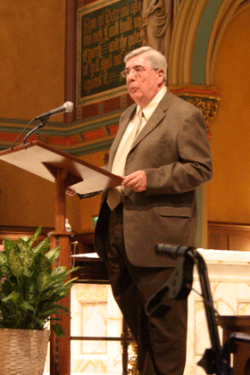Make death your friend and live life to the fullest, says deacon

SALT LAKE CITY — The Cathedral of the Madeleine celebrated its 100th anniversary as an icon of faith and service in Utah. A series of events highlighted the cathedral’s role as a catalyst for change through the arts and humanities, education, and social justice. The cathedral is also a symbol of hope even when facing death. The Catholic perspective on death was beautifully expressed by John Henry Cardinal Newman, one of the finest writers of the 19th century, in his "The Dream of Gerontius." Deacon Owen Cummings, professor of Theology at Mount Angel Seminary in Oregon, presented a lecture on Newman’s work at the Cathedral August 11. There were two reasons why Cummings chose "The Dream of Gerontius" as a topic: It was going to be performed by the Cathedral Choir and Orchestra under the direction of Gregory Glenn the following day and it is "about death and what happens afterward. It touches everyone due to the fact that we will all die," he said. The epic poem by Newman was written in three weeks and was published that same year. It represents death as peace, said Cummings. He compared the "dream" with a gloomier representation of death in the poem by Dylan Thomas: "Do not go gentle into that good night, Old age should burn and rave at close of day; Rage, rage against the dying of the light…" "The Dream of Gerontius" speaks of a universal theme. The poem is about an old Christian man who is transitioning from life to death and it transports us through his emotions. The writer’s ultimate message is an invitation to make death our friend and to live life TO the fullest and with love. As Saint Irenaeus from Lyon, France said, "The glory of God is man fully alive," said Cummings. Newman’s poem starts with the old man in fear because he is facing death. "Jesu, Maria – I am near to death, And thou art calling me; I know it now. Not by the token of this faltering breath, This chill at heart, this dampness on my brow, Jesu, have mercy! Mary, pray for me! ‘Tis this new feeling, never felt before, Be with me, Lord, in my extremity! That I am going, that I am no more." The old man’s friends pray for him to have a gentle journey. "Go forth upon thy journey, Christian soul! Go from this world! Go, in the name of God…" After his friends’ prayers, the man dies and finds peace. "I went to sleep; and now I am refreshed. A strange refreshment: for I feel in me An inexpressive lightness, and a sense Of freedom, as I were at length myself, And ne’er had been before. How still it is!" The man later asks his guardian angel why he no longer has fear to meet God. "Along my earthly life, the thought of death And judgment was to me most terrible… Now that the house is come, my fear is fled… Now close upon me, I can forward look With a serenest joy." After this, his angel replies: "What then – if such thy lot – thou seest thy Judge, The sight of him will kindle in thy heart, All tender, gracious, reverential thoughts. Thou wilt be sick with love, and yearn for him… There is a pleading in his pensive eyes Will pierce thee to the quick, and trouble thee. And thou wilt hate and loathe thyself; for though Now sinless, thou wilt feel that thou hast sinn’d As never thou didst feel; and wilt desire To slink away, and hide thee from his sight… The shame of self at thought of seeing Him, Will be thy veriest, sharpest purgatory." "So, in the presence of God, the man feels the pain of regret," said Cummings. At the moment of regret, the old man starts to hear voices from the earth. They are from his friends who are praying. He then asks his angel to take him away. The angel’s reply to the old man reminds us of the Sacrament of Baptism. "I poise thee, and I lower thee, and hold thee. And carefully I dip thee in the lake…" The poem ends with the angel saying farewell to the man. "Be brave and patient on thy bed of sorrow; Swiftly shall pass thy night of trial here, And I will come and wake three on the morrow." Cummings said Newman is one of this theological heroes because he was a man of education and also a man of church. "He did not want Catholics to be narrow minded," said Cummings. Part of Newman’s philosophy is summarized in what he said about a wholesome education: "It is well to be a gentleman, it is well to have a cultivated intellect, a delicate taste, a candid, equitable, dispassionate mind, a noble and courteous bearing in the conduct of life – these are the connatural qualities of a large knowledge. They are the objects of a University; I am advocating, I shall illustrate and insist upon them; but still, I repeat, they are no guarantee for sanctity or even for conscientiousness. They may attach to the man of the world, to the profligate, to the heartless."
© Copyright 2025 The Diocese of Salt Lake City. All rights reserved.

Stay Connected With Us